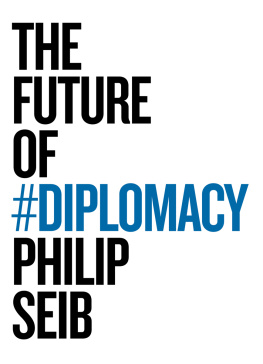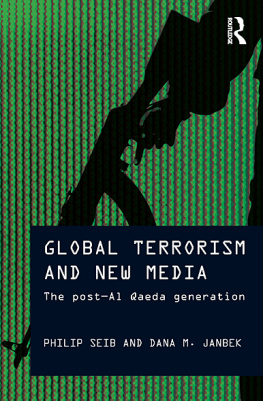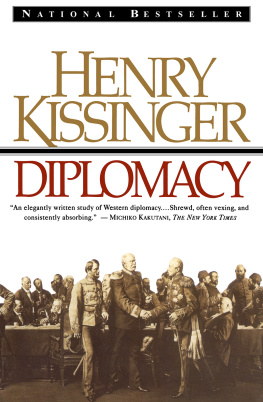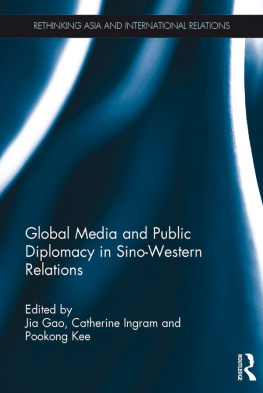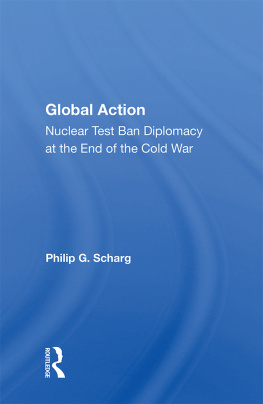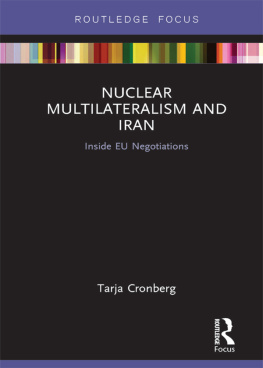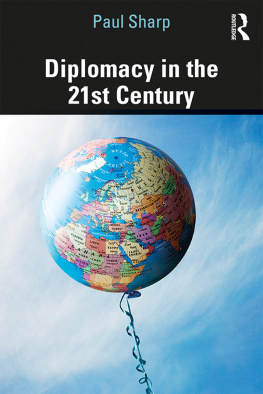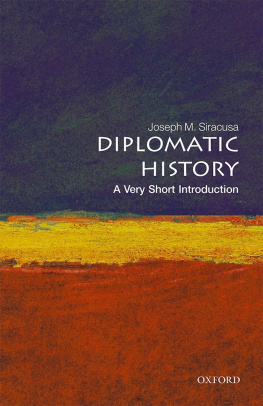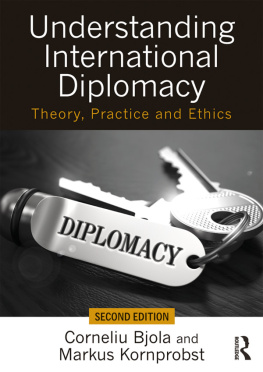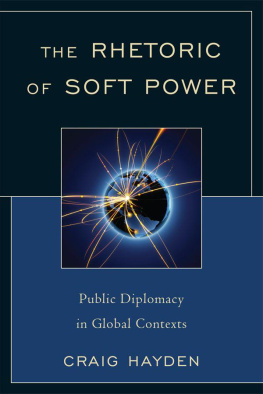Contents
Guide
Pages

The Future of Diplomacy
Philip Seib
polity
Copyright Philip Seib 2016
The right of Philip Seib to be identified as Author of this Work has been asserted in accordance with the UK Copyright, Designs and Patents Act 1988.
First published in 2016 by Polity Press
Polity Press
65 Bridge Street
Cambridge CB2 1UR, UK
Polity Press
350 Main Street
Malden, MA 02148, USA
All rights reserved. Except for the quotation of short passages for the purpose of criticism and review, no part of this publication may be reproduced, stored in a retrieval system, or transmitted, in any form or by any means, electronic, mechanical, photocopying, recording or otherwise, without the prior permission of the publisher.
ISBN-13: 978-1-5095-0723-8
A catalogue record for this book is available from the British Library.
Library of Congress Cataloging-in-Publication Data
Names: Seib, Philip M., 1949- author.
Title: The future of diplomacy / Philip Seib.
Description: Cambridge, UK ; Malden, MA : Polity Press, [2016] | Includes bibliographical references and index.
Identifiers: LCCN 2015046315 (print) | LCCN 2015049255 (ebook) | ISBN 9781509507191 (hardcover : alk. paper) | ISBN 9781509507207 (pbk. : alk. paper) | ISBN 1509507191 (hardcover : alk. paper) | ISBN 1509507205 (pbk. : alk. paper) | ISBN 9781509507221 (mobi) | ISBN 9781509507238 (epub)
Subjects: LCSH: Diplomacy.
Classification: LCC JZ1305 .S444 2016 (print) | LCC JZ1305 (ebook) | DDC 327.2--dc23
LC record available at http://lccn.loc.gov/2015046315
The publisher has used its best endeavours to ensure that the URLs for external websites referred to in this book are correct and active at the time of going to press. However, the publisher has no responsibility for the websites and can make no guarantee that a site will remain live or that the content is or will remain appropriate.
Every effort has been made to trace all copyright holders, but if any have been inadvertently overlooked the publisher will be pleased to include any necessary credits in any subsequent reprint or edition.
For further information on Polity, visit our website: politybooks.com
Preface
The purpose of this short book is to stimulate thinking and conversation about the ways diplomacy is changing and what diplomacys future is likely to hold.
Although I love diplomatic history, I have minimized historical material in the book, providing just enough to establish context as needed. Countless volumes are available that exhaustively examine where we have been. Far less has been written about where we are going. That is what interests me now.
This is a heady time to be considering such matters. Not since Gutenberg has communication changed as profoundly as has happened during the past decade or two, thanks to the internet. The latest manifestation of this change is seen in the pervasiveness of mobile technology, which means more people are connected to more of the world more of the time. This phenomenon is still lopsided; people in the most developed nations are the most connected. But that is changing. Inexpensive smartphones and expanding internet access are proving to be great equalizers. The global village is moving from clich to reality.
These new connections are being used for more than mindless chit-chat and the exchange of cute cat videos. People are learning more about the world around them, and not in passive ways. Their new communication tools allow them to gather information and to converse at levels that have never before been feasible. They can watch what their own and other governments are doing and participate in debate about those doings. They can also use these tools to disseminate information themselves: emailing, posting, tweeting, as well as talking. A few minutes of video on YouTube can be seen worldwide almost instantly, leaping across borders, defying gatekeepers, and stimulating reaction.
When people learn from YouTube or a regional satellite television channel that a young man has set himself on fire because of hopelessness caused by political oppression, the sympathy and anger generated in response can also be transmitted so quickly and widely that a revolution might be born. When people use online networks to tell each other about the plight of refugees who are flooding across borders, compassionate responses might help alleviate the problem. Or, on the darker side, hateful reaction might spread.
All this matters to diplomats because during past centuries their work had proceeded at a measured pace. Theirs was a closed club elite, male, and disdainful of anyone outside their circle. No more. The ranks of diplomats have been opened to become more inclusive and egalitarian, and the publics attention to their work has grown exponentially.
This was obvious in 2015 in events surrounding the Joint Comprehensive Plan of Action the Iran nuclear agreement. I have included quite a bit of information about these negotiations and their aftermath because the publics involvement in the debate about the plan provided good examples of the diplomacy that exists beyond the work of professional diplomats. Taking advantage of the connectivity provided by new media tools, especially social media, advocates and opponents of the nuclear deal conducted a global debate designed to influence implementation of the agreement. An issue that once would have remained exclusively the business of a small cadre of diplomats and other officials moved into the public domain. Doors to the world of diplomacy had been thrown wide open, and this affected how the negotiations were conducted and how the surrounding political debate took shape.
This is diplomacys present, and it foreshadows a fast-evolving future.
I had valuable help with this book. My principal debt is to my wonderful research assistant, Sohaela Amiri. Brilliant and hardworking, she tracked down essential material and steered me away from my tendency to embrace the obscure. Some friends read parts of the manuscript or discussed ideas with me, and they provided valuable insights: Bob Banks, Donna Bragg, Dina Jadallah, Elizabeth Linder, Melody Mohebi, and Andreas Sandre.
At Polity, my editor, Louise Knight, was a joy to work with. She guided me through the entire publishing process, from numerous revisions of my proposal to the final version of the book. She understands my odd temperament and manages it well. Louises assistant, Nekane Tanaka Galdos was also most helpful and patient. Paul Sharp and an anonymous reviewer provided valuable suggestions about the draft manuscript.
At the University of Southern California, being surrounded by smart colleagues has been a pleasure. Special thanks to Ernest Wilson, Dean of USCs Annenberg School for Communication and Journalism.
I also want to pay tribute to the diplomats, scholars, journalists and others, past and present, whose work has long nurtured my interest in diplomacy: John Lewis Gaddis, Richard Holbrooke, George Kennan, Margaret MacMillan, James Mann, Harold Nicolson, Joseph Nye, David Rothkopf, William Rugh, Mary Elise Sarotte, John Wheeler-Bennett, Lawrence Wright... the list is much longer than this and keeps growing.
Most of all, I honor the diplomats and their professional kin who work in often difficult, and sometimes dangerous, circumstances, not only for their own countries, but also to improve the lives of the people amidst whom they serve. They continue to shape the future of diplomacy.
Introduction
For centuries, diplomacy was the domain of an insular elite. The protagonists worked quietly, often secretly, until ready to unveil their accomplishments or lack thereof. Diplomats were comfortable in this closed environment, speaking just to one another and paying little heed to those publics whose future might be shaped by their work. British diplomat Harold Nicolson, in his 1939 book

